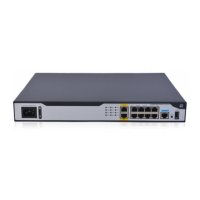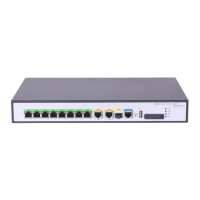95
Parameters
ipv4-address: Specifies the IPv4 address of the peer.
ipv6 ipv6-address: Specifies the IPv6 address of the peer.
fqdn fqdn-name: Specifies the FQDN of the peer. The fqdn-name argument is a case-sensitive
string of 1 to 255 characters, such as www.test.com.
email email-string: Specifies the email address of the peer. The email-string argument is a
case-sensitive string of 1 to 255 characters in the format defined by RFC 822, such as
esec@test.com.
key-id key-id-string: Specifies the remote gateway's key ID. The key-id-string argument is a
case-sensitive string of 1 to 255 characters, and is usually a vendor-specific string for doing
proprietary types of identification.
Usage guidelines
Only the responder can look up an IKEv2 peer by ID in IKEv2 negotiation. The initiator does not know
the peer ID when initiating the IKEv2 negotiation, so it cannot use an ID for IKEv2 peer lookup.
Examples
# Create an IKEv2 keychain named key1.
<Sysname> system-view
[Sysname] ikev2 keychain key1
# Create an IKEv2 peer named peer1.
[Sysname-ikev2-keychain-key1] peer peer1
# Specify the peer IPv4 address 1.1.1.2 as the ID of the IKEv2 peer.
[Sysname-ikev2-keychain-key1-peer-peer1] identity address 1.1.1.2
Related commands
ikev2 keychain
peer
New command: identity local
Use identity local to configure the local ID, the ID that the device uses to identify itself to the peer
during IKEv2 negotiation.
Use undo identity local to restore the default.
Syntax
identity local { address { ipv4-address | ipv6 ipv6-address } | dn | email email-string | fqdn
fqdn-name | key-id key-id-string }
undo identity local
